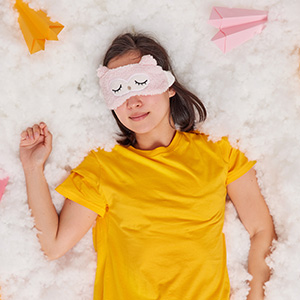Nightguards
A nightguard protects your teeth and jaw from the damaging forces of bruxism (teeth grinding and clenching). Our custom-fit appliances offer superior comfort and durability.



A buffer against bruxism
Teeth grinding and clenching, especially when it happens unconsciously during sleep, can lead to chipped teeth, worn enamel, broken restorations, and pain. A nightguard, which fits over the teeth like a whitening tray or clear aligner, can keep damage at bay by acting as a cushion against those grinding forces.
If you’ve purchased a DIY nightguard, you’re probably familiar with waking up and finding it on the floor. Because a custom nightguard is designed especially for your mouth using medical-grade materials, it provides a better fit and protection, and it’s more likely to stay put while you snooze.
The nightguard keeps your teeth safe from the damaging effect of clenching and grinding.
The appliance acts as a cushion, which can reduce the jaw pain, TMJ dysfunction, and headaches associated with bruxism.
By warding off jaw and tooth pain, wearing a nightguard may help you sleep more soundly.
What to expect when getting a nightguard

The dentist will perform an exam and ask you questions to determine if your bruxism is causing damage and pain. If it is, they may recommend a custom nightguard.

A team member will use our iTero® Element scanner to take digital dental impressions. Your nightguard will be fabricated out of a thermoplastic material based on your impressions.

The dentist will have you try on your nightguard. They’ll evaluate the fit and make any minor adjustments if needed. From there, you’ll wear your nightguard when you go to sleep to keep your smile safe.
What causes bruxism?
Bruxism can be caused by stress, anxiety, a misaligned bite, airway obstruction, certain medications, and sleep disorders. The issue can affect kids, teens, and adults.
What are the signs of bruxism?
Many people find themselves clenching and grinding during the day. If you grind your teeth while awake, known as awake bruxism, you may also be doing it while you sleep. Sleep bruxism isn’t always evident because, well, you’re sleeping. Signs include:
- Waking up with a sore jaw and teeth
- Uneven enamel wear
- Chipped or broken teeth
- Damaged dental restorations
- Headaches, ear aches, facial pain, and TMJ pain
What’s the difference between custom and over-the-counter nightguards?
Over-the-counter nightguards are generally one-size-fits-all or the boil-and-bite type that you’re able to customize to some degree. They don’t always fit properly, and the materials can be clunky. This is why people often complain that they spit them out regularly during the night.
A custom nightguard is fabricated based on your dental impressions, giving you the perfect fit. It’s also made from a medical-grade material that’s more durable and lightweight than what you can get over-the-counter. This makes them easier and more comfortable to wear.

